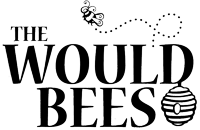The Goal of Parenting: Guiding your child to “see, believe, then do.”
We all want the best for our children. The complications of wanting the best is to overlook the process of becoming the best. The process takes time and commitment of the parent to guide the child with vision, discipline and support. Key elements to the process: 1) adopting an empowering vocabulary to encourage and reinforce the small steps that lead to greater success; 2) focusing on the improvement as the “win”; and 3) encouraging a commitment to the process of learning that creates a sense of discipline in your child that is their own choice…eventually.
A quick summary of the Would Bees.
The Would Bees is a Fable told through the eyes of two young bunnies. It reinforces the idea that we all need to be the best we can be and that we should be loved for who we are. While there is a lot of advice on what we should be and ought to do, it is important not to lose sight of the beauty of our own moments and to not be confused by the chatter of the “Would Bees” who may only know what they should be, ought to be, and want to be. Children of all ages need to learn to listen and then decide on what path best suits them. Being willing to try different paths is important.
Why write this book? Why now?
Having grown up with the Would Bees in my life, and trying to raise my own seven children to be the best they can be at whatever their endeavor, I have finally found time to share the insights learned with others. Time created in my reduced hours as a trial attorney has allowed me to share the practical lessons learned during my own parenting and coaching experiences.
Why is developing a sense of self-worth as a child important?
The challenges to a child’s self-esteem abound. It is necessary to reinforce a positive self-image, and then teach the techniques of stress management and the ABCs of Performance to protect and encourage self-improvement. Stress Management Techniques include: positive visualization, positive affirmations, deep breathing, realistic goal setting, time management and meditative exercises that can include self-hypnosis. The ABCs of Performance include: “A” for right attitude which is both internally positive sparked by positive words of affirmation and reinforcement, and being externally appreciative and gracious to those around you. “B” is for best efforts in performance and preparation for performance. Practice develops the mindset of a capable and confident person during performance. “C” is for consistent pre-performance work and commitment to being the best you can be. Henry Ford apply said: “If you think you can, or think you can’t, you are probably right.”
What do you mean by “being the best you can be”?
Learning what your options are is key to self-improvement. You can observe others’ performance, but you are not them and translating positive role model traits into your own performance is part of the performance goal which requires practice. Realistic goal setting, both short term and long term, mitigates stress and disappointment.
Why do you call yourself the “Beekeeper”?
The Beekeeper label is the aspirational goal, or should be, for us all. We each need to keep our own being healthy, safe, and open to new possibilities without losing our sense of self-worth. I am the Beekeeper for myself and can offer insights to others in becoming their own “Beekeeper.”
What are expectations?
Expectations begin and sometimes end with another’s dream for a child’s performance. Realistic expectations supported by work and discipline can make expectations become a reality. The caution for parents is to listen to their child and not just chatter away like a Would Bee. Children want parental appreciation and the task for parents is learning how to communicate and encourage at the same time. Self-esteem is a fragile perspective on self and performance. Small improvements are just as important, if not more so, then the “win.” In fact, it’s the small improvements that are the wins which contribute to the bigger Win.
What are some confusing things about expectations?
Expectations often exceed where we are in our development. Expectations can create stress which can be good or bad. If failure is the fear then stress is bad. If the challenge is embraced then the “challenge stress” is a motivator and the effort is not tied to the end result. Win or lose, the performance is a step forward, if expectations focus on being the best one can be at that moment.
Why is being adventurous and inquisitive important in learning about yourself?
Taking chances is part of growing, and chances in facing the unknown expands confidence, no matter the result, provided results are not the immediate goal. We learn from our mistakes and adjust in our next performance. That is why effort is not a mistake but a stepping stone to future growth. There is no straight line to finding the best you can be.
How can you extend the experience of reading The Would Bees into your life?
It is important to listen and consider the advice of others. What is not ok is to lose sight of who you are and what you want to be in this life because of all the chatter of the “should bees”, “wanna bees”, and “have to bees”. Building a positive self-image and reinforcing the image with stress management techniques and the ABCs of Performance gives you space to consider changes without giving up the uniqueness of your own person. The story of the Would Bees is a step forward in being the best you can be.

